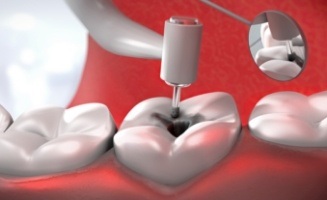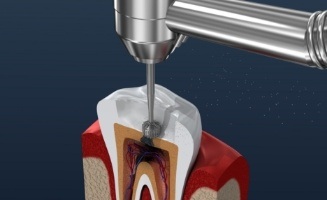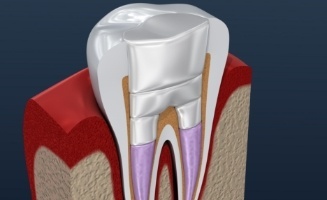Root Canal Treatment – Edison, NJ
Get the Fast Relief You Need
What Is Root Canal Treatment?

Root canal treatment is a restorative dentistry procedure that is used to protect damaged teeth. It's necessary when the inside of your natural tooth has become infected with bacteria. This can happen due to an untreated cavity, or when a tooth is broken or cracked by dental trauma and is not repaired in a timely manner.
When the inside of the tooth becomes infected, this causes a lot of pain. Tooth infections may result in further complications like tooth loss or sepsis, a very dangerous blood infection. Root canal treatment is used to remedy infected teeth. In this procedure, the tooth is opened up, the infected material is removed, and the tooth is filled up and sealed to protect it. Contact us now to see if you need root canal treatment in Edison.
How it works: The root canal treatment process
Preparation & Numbing

To begin the root canal process, Dr. Shefat Rabbi will clean your mouth and use numbing spray and a needle to anesthetize the treatment area. He can also provide sedation, if desired. It will take a few minutes for your tooth to become completely numb.
Opening up the tooth

After your tooth is numb your tooth pain is gone, Dr. Shefat Rabbi will remove damaged material from the tooth and create a small opening in the tooth. This opening allows him to access the infected material inside the structure of the tooth.
Cleaning the Inside of the Tooth

Next, Dr. Shefat Rabbi will use some special dental tools to gently remove decayed and damaged pulp from the interior of the tooth. Once your pulp has been extracted, he will sanitize and flush the tooth to eliminate bacteria.
Filling The tooth

Once the tooth is free of tooth decay, Dr. Shefat Rabbi will fill it with a rubbery material that replaces the missing pulp, strengthening the interior of the tooth.
Tooth Restoration

As the final step, Dr. Shefat Rabbi will place a filling or a temporary dental crown to cover up and protect your tooth. Patients may need to schedule a follow-up appointment to get a permanent porcelain crown.
Types of root canal treatment
Anterior Root Canals

Anterior root canals are performed on your anterior, or front, teeth. They are considered to be more difficult and complex than posterior (rear or molar) root canals. This is because the front teeth are smaller, and do not have a large chewing surface.
In the standard posterior root canal procedure, an opening can be created on the top, or crown, of a molar or premolar. This is not possible with an anterior tooth, so an opening must be created in the lingual surface of the tooth on the side that faces the tongue. In addition, it can be more difficult to restore anterior teeth with a crown or a filling, since the surface of the tooth is much smaller.
Posterior Root Canals

Posterior root canals are a more common treatment. The posterior teeth (molars and premolars) become infected more commonly than the front teeth because they have deeper pits, grooves, and fissures that can harbor cavity-causing bacteria and plaque.
In a posterior root canal, an opening is made in the top chewing surface of the tooth, which provides easy access to the interior pulp and root canals. Once the procedure is complete, the tooth is restored with either a filling or a crown, depending on which will best support the remaining tooth structure.
Root Canal FAQs
What causes a root canal?
You will need root canal treatment if your tooth becomes infected. This happens one of two ways: a serious cavity can eat away at the outer layers of your enamel and dentin. Eventually, this decay will expose the vulnerable pulp (the material that keeps your tooth alive) to bacteria that causes the infection.
Dental trauma can crack the enamel and dentin, exposing the nerve and blood vessel-filled tooth pulp to oral bacteria.
Regardless of how the infection occurs, the pulp will begin to decay and die once it becomes infected. When this happens, you'll experience symptoms like a toothache, gum inflammation near the tooth, and tooth sensitivity.
Does root canal treatment hurt?
No. It's a common myth that root canal treatment hurts when, in fact, it is the toothache caused by the infection that is painful. In modern dentistry, there's no need for pain. Root canal treatment is similar to receiving a dental filling.
Your mouth will be completely numb during the procedure, and you can even be sedated at our dental office, if you wish. Getting a root canal is the best way to rid yourself of the pain and discomfort of an infected tooth, which can be very severe.
Can root canal treatment fail and what happens if it does?
In rare cases, root canal treatment can fail. If not all of the decayed material and bacteria are removed, the tooth infection may come back. If this happens, you’ll come back to our office for endodontic retreatment. Your dentist in Edison will re-open your tooth and repeat the root canal process and ensure that the infection is completely removed.
A root canal can be considered emergency dentistry. Contact us immediately if you feel you need a root canal or if your root canal treatment has failed.
Do I always need a dental crown with a root canal?
Not always. Dental crowns are usually the best way to protect your tooth after root canal treatment and are recommended for posterior teeth (molars and premolars). However, fillings are sometimes used to fill front teeth. Your Edison dentist will let you know if you need a crown or a filling after your root canal appointment.
Is root canal treatment covered by dental insurance?
Root canal treatment is usually covered by the vast majority of dental insurance policies to some degree. However, we do recommend that you consult with your insurance provider so that you understand your benefits and which treatments are covered.
